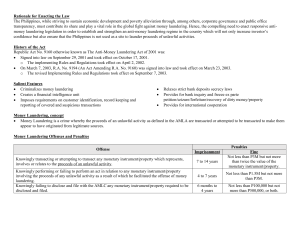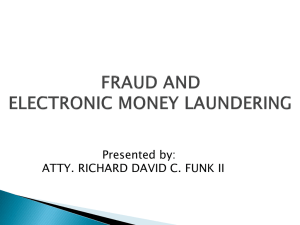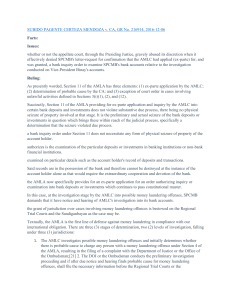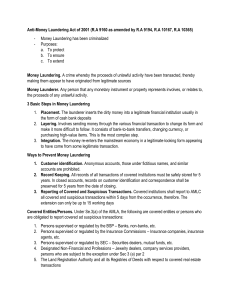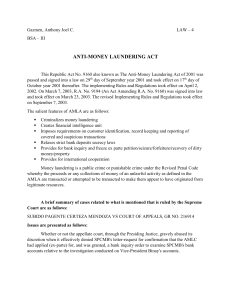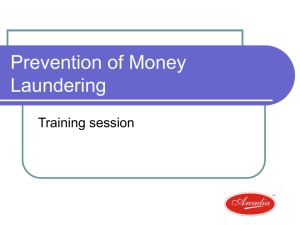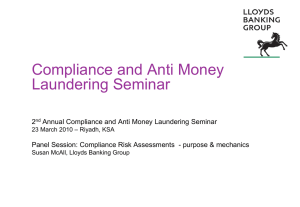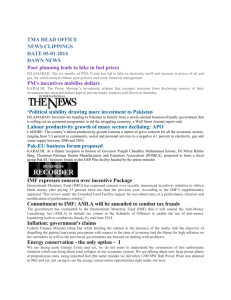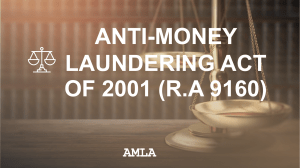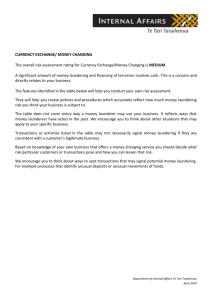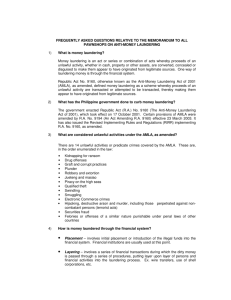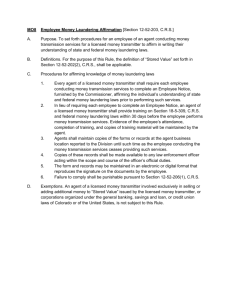copy of the article - SyCip, Salazar, Hernandez & Gatmaitan
advertisement
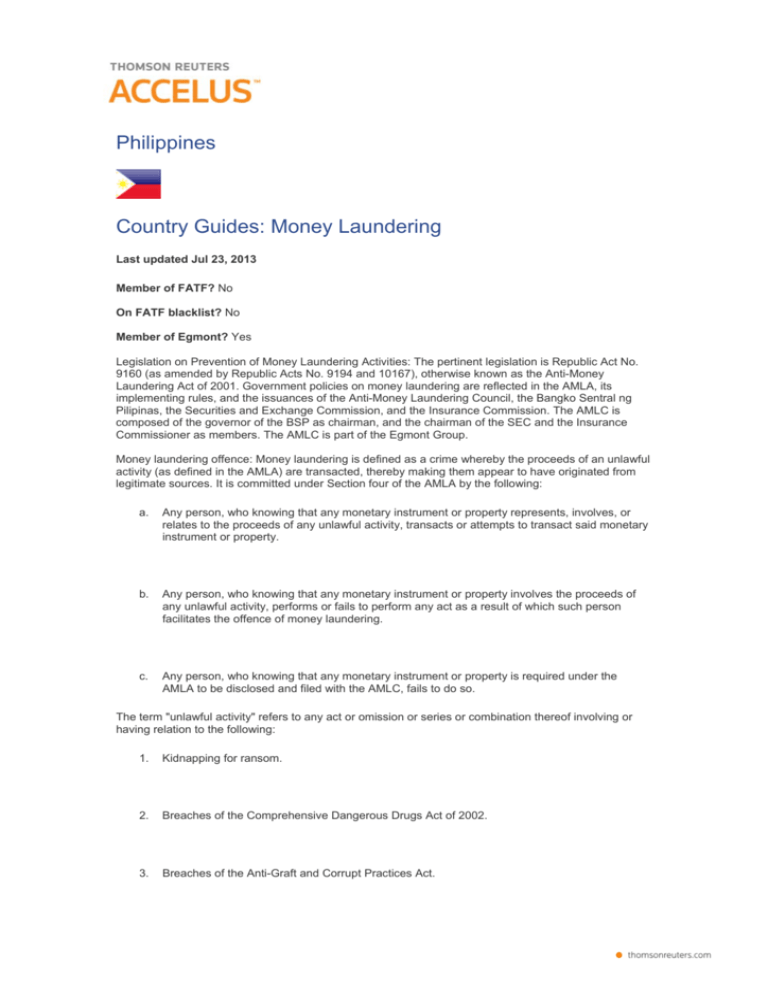
Philippines Country Guides: Money Laundering Last updated Jul 23, 2013 Member of FATF? No On FATF blacklist? No Member of Egmont? Yes Legislation on Prevention of Money Laundering Activities: The pertinent legislation is Republic Act No. 9160 (as amended by Republic Acts No. 9194 and 10167), otherwise known as the Anti-Money Laundering Act of 2001. Government policies on money laundering are reflected in the AMLA, its implementing rules, and the issuances of the Anti-Money Laundering Council, the Bangko Sentral ng Pilipinas, the Securities and Exchange Commission, and the Insurance Commission. The AMLC is composed of the governor of the BSP as chairman, and the chairman of the SEC and the Insurance Commissioner as members. The AMLC is part of the Egmont Group. Money laundering offence: Money laundering is defined as a crime whereby the proceeds of an unlawful activity (as defined in the AMLA) are transacted, thereby making them appear to have originated from legitimate sources. It is committed under Section four of the AMLA by the following: a. Any person, who knowing that any monetary instrument or property represents, involves, or relates to the proceeds of any unlawful activity, transacts or attempts to transact said monetary instrument or property. b. Any person, who knowing that any monetary instrument or property involves the proceeds of any unlawful activity, performs or fails to perform any act as a result of which such person facilitates the offence of money laundering. c. Any person, who knowing that any monetary instrument or property is required under the AMLA to be disclosed and filed with the AMLC, fails to do so. The term "unlawful activity" refers to any act or omission or series or combination thereof involving or having relation to the following: 1. Kidnapping for ransom. 2. Breaches of the Comprehensive Dangerous Drugs Act of 2002. 3. Breaches of the Anti-Graft and Corrupt Practices Act. 4. Plunder under Republic Act No. 7080, as amended. 5. Robbery and extortion. 6. Jueteng and Masiao punished as illegal gambling. 7. Piracy on the high seas. 8. Qualified theft. 9. Swindling. 10. Smuggling. 11. Breaches of the Electronic Commerce Act of 2000. 12. Hijacking and other breaches under Republic Act No. 6235; destructive arson and murder, including those perpetrated by terrorists against non-combatant persons and similar targets. 13. Terrorism and conspiracy to commit terrorism, and financing of terrorism as defined in the Terrorism Financing Prevention and Suppression Act of 2012. 14. Bribery and certain other offenses under the Revised Penal Code. 15. Certain violations of the Anti-Trafficking of Persons Act of 2003; Revised Forestry Code of the Philippines; Philippine Fisheries Code of 1998; Philippine Mining Act of 1995; Wildlife Resources Conservation and Protection Act; National Caves and Cave Resources Management Protection Act; Anti-Carnapping Act of 2002; Decree Codifying the Laws on Illegal/Unlawful Possession, Manufacture, Dealing In, Acquisition of Firearms, Ammunitions or Explosives; Anti-Fencing Law; Migrant Workers Overseas Filipinos Act of 1995; Intellectual Property Code; Anti-Child Pornography Act of 2009; Anti-Photo and Video Voyeurism Act of 2009; and Special Protection of Children Against Abuse, Exploitation and Discrimination Act. 16. Fraudulent practices and other breaches under the Securities Regulation Code of 2000. 17. Felonies or offences of a similar nature that are punishable under the penal laws of other countries. Reports A covered institutions (i.e., an entity supervised or regulated by the BSP, the SEC or the IC) must file with the AMLC a covered transactions report for transactions in cash or equivalent monetary instrument involving a total amount in excess of P500,000 ($11,630) within one banking day. Regardless of the amount involved, a suspicious transaction report is to be filed by a covered institution where any of the following circumstances exists: 1. there is no underlying legal or trade obligation, purpose or economic justification; 2. the client is not properly identified; 3. the amount involved is not commensurate with the business or financial capacity of the client; 4. taking into account all known circumstances, it may be perceived that the client's transaction is structured to avoid being the subject of reporting requirements under the AMLA; 5. any circumstance, relating to the transaction, is observed to deviate from the profile of the client and/or the client's past transactions with the covered institution; 6. the transaction is in any way related to an unlawful activity or any money laundering activity or offence under the AMLA that is about to be, is being or has been committed; or 7. any transaction that is similar, analogous or identical to any of the foregoing. Investigation by AMLC The AMLC investigates suspicious transactions, covered transactions deemed suspicious after an investigation conducted by the AMLC, money laundering activities, and other breaches of the AMLA. Freezing of monetary instrument or property Upon verified ex parte petition by the AMLC and after determination that a probable cause exists that any monetary instrument or property is in any way related to an unlawful activity, the Court of Appeals may issue a freeze order which takes effect immediately. The freeze order is for a period of not exceeding six months depending upon the circumstances of the case. In any case, the court is required to act on the petition to freeze within 24 hours from the filing thereof. If the petition is filed a day before a non-working day, the computation of the 24-hour period will exclude the non-working day. A person whose account is frozen may file a motion to lift the freeze order and the Court must resolve the same before the expiration of the original freeze order. Inquiry into deposits or investments Notwithstanding the provisions of the Secrecy of Bank Deposit Law, the Foreign Currency Deposit Act and the General Banking Law of 2000, the AMLC may inquire into or examine deposits or investments, including related accounts, with any banking or non-banking institution upon the order of any competent court based upon an ex parte application of the AMLC, in cases of violations of the AMLA, when it has been established that there is a probable cause that such deposits or investments and accounts are related to an unlawful activity or a money laundering offense. No court order is required for such inquiry or examination, in cases involving kidnapping for ransom, breaches of the Comprehensive Dangerous Drugs Act of 2002, hijacking and other breaches of Republic Act No. 6235, destructive arson and murder (including those perpetrated by terrorists against non-combatants and similar targets), or offenses of a similar nature to the foregoing which are punishable under the laws of other countries, and terrorism and conspiracy to commit terrorism. The court must act on such ex parte application within 24 hours from the filing thereof. Penalties Money laundering under Section 4(a), (b) (c) and (d) of the AMLA carries a penalty of imprisonment ranging from seven to 14 years and a fine ranging from P3,000,000 ($69,770) to twice the value of the monetary instrument or property involved in the offence. Those convicted under Section 4(e) and (f) of the AMLA may be imprisoned from four to seven years and fined from P1,500,000 ($34,8854) to P3,000,000 ($69,770), while those convicted under the last paragraph of Section 4 will be subject to imprisonment from six months to four years or a fine of not less than P100,000 ($2,325) but not more than P500,000 ($11,630), or both, at the discretion of the court. The penalty of imprisonment ranging from four to seven years and a fine corresponding to not more than 200 percent of the value of the monetary instrument or property laundered may be imposed upon the covered institution, its directors, officer, or personnel who knowingly participated in the commission of the crime of money laundering. Rafael Morales is the managing partner at SyCip Salazar Hernandez & Gatmaitan. He can be contacted on ramorales@ syciplaw.com or (632) 9823500/ 9823600/ 9823700 Originally published on http://accelus.thomsonreuters.com/ Thomson Reuters © 2013
